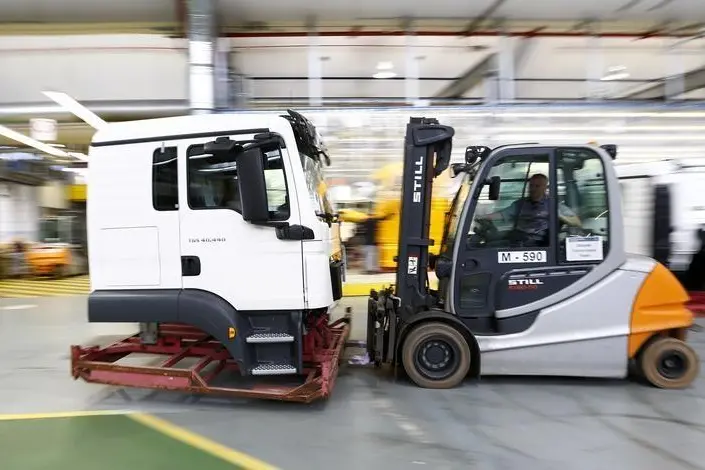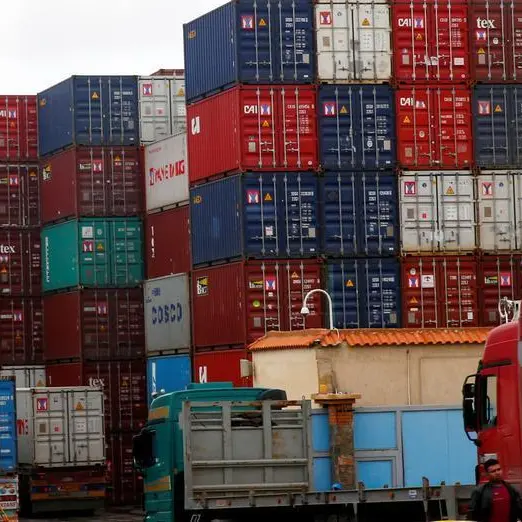PHOTO
* Q1 exports to Iran rise 7 pct y/y to 500 mln euros
* Strong demand for machines, equipment, grains, wheat
* 2016 exports could hit 2.5-3 bln euros -expert
BERLIN, May 26 (Reuters) - German exports to Iran, especially of machines and equipment, rose significantly in the first quarter following the removal of international sanctions against the Islamic Republic, government data showed on Thursday.
Exports to Iran surged by 7 percent year-on-year in the January-March period to 500 million euros ($558.85 million), the Federal Statistics Office said. This compares with a 0.7 percent rise in overall, year-on-year German exports in the same period.
"This is quite reasonable," said Michael Tockuss, head of the German-Iranian Chamber of Commerce. "Machines and equipment are doing exceptionally well, but also grain and wheat."
For decades before sanctions were imposed, Germany was Iran's biggest trading partner. The gap in Iranian imports from Germany and other Western countries was subserquently filled by Chinese, Korean and Middle Eastern competitors.
German industry anticipated a steep rise in exports to Iran after world powers lifted crippling sanctions against the Islamic Republic in January in return for Tehran's compliance with a deal to curb its nuclear ambitions.
However, Tockuss said great expectations arising from the nuclear deal have been dampened by difficulties in financing as Western banks remain reluctant to do business in Iran for fear of transparency issues that could lead to fines.
The Paris-based Financial Action Task Force (FATF) said in February it was still concerned about what it called Iran's failure to address the risk of terror financing and the serious threat this poses to the global financial system.
"The whole big euphoria that existed a few months ago has evaporated a little bit," said Tockuss. "This is mainly because of the big difficulties with financing."
He added that Iran had shown interest in large-scale projects to build refineries and petrochemical factories and cement plants, but was unable to finance such undertakings with credit from foreign banks.
"Its own banks lack liquidity. They are dependent on our banks to finance projects," Tockuss said. Despite such difficulties, he said, Germany should expect business with Iran to outperform activity with most other emerging markets.
German exports to Iran could reach 2.5-3 billion euros this year, up from 2 billion euros in 2015, he added.
Germany's Chambers of Commerce and Industry (DIHK) expects exports to Iran to reach 5 billion euros in the coming years and reach twice that figure in the long term. ($1 = 0.8947 euros)
(Reporting by Rene Wagner; Writing by Joseph Nasr; Editing by Mark Heinrich) ((Joseph.Nasr@thomsonreuters.com; +49 172 678 5836; Reuters Messaging: joseph.nasr.thomsonreuters.com@reuters.net))
* Strong demand for machines, equipment, grains, wheat
* 2016 exports could hit 2.5-3 bln euros -expert
BERLIN, May 26 (Reuters) - German exports to Iran, especially of machines and equipment, rose significantly in the first quarter following the removal of international sanctions against the Islamic Republic, government data showed on Thursday.
Exports to Iran surged by 7 percent year-on-year in the January-March period to 500 million euros ($558.85 million), the Federal Statistics Office said. This compares with a 0.7 percent rise in overall, year-on-year German exports in the same period.
"This is quite reasonable," said Michael Tockuss, head of the German-Iranian Chamber of Commerce. "Machines and equipment are doing exceptionally well, but also grain and wheat."
For decades before sanctions were imposed, Germany was Iran's biggest trading partner. The gap in Iranian imports from Germany and other Western countries was subserquently filled by Chinese, Korean and Middle Eastern competitors.
German industry anticipated a steep rise in exports to Iran after world powers lifted crippling sanctions against the Islamic Republic in January in return for Tehran's compliance with a deal to curb its nuclear ambitions.
However, Tockuss said great expectations arising from the nuclear deal have been dampened by difficulties in financing as Western banks remain reluctant to do business in Iran for fear of transparency issues that could lead to fines.
The Paris-based Financial Action Task Force (FATF) said in February it was still concerned about what it called Iran's failure to address the risk of terror financing and the serious threat this poses to the global financial system.
"The whole big euphoria that existed a few months ago has evaporated a little bit," said Tockuss. "This is mainly because of the big difficulties with financing."
He added that Iran had shown interest in large-scale projects to build refineries and petrochemical factories and cement plants, but was unable to finance such undertakings with credit from foreign banks.
"Its own banks lack liquidity. They are dependent on our banks to finance projects," Tockuss said. Despite such difficulties, he said, Germany should expect business with Iran to outperform activity with most other emerging markets.
German exports to Iran could reach 2.5-3 billion euros this year, up from 2 billion euros in 2015, he added.
Germany's Chambers of Commerce and Industry (DIHK) expects exports to Iran to reach 5 billion euros in the coming years and reach twice that figure in the long term. ($1 = 0.8947 euros)
(Reporting by Rene Wagner; Writing by Joseph Nasr; Editing by Mark Heinrich) ((Joseph.Nasr@thomsonreuters.com; +49 172 678 5836; Reuters Messaging: joseph.nasr.thomsonreuters.com@reuters.net))





















